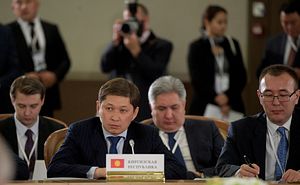As a series of corruption trials comes to a close in Kyrgyzstan, Bishkek faces the opportunity — sparked by recent investigative reports — to truly dig into inconvenient instances of corruption. While there has been no shortage of corruption trials in the Central Asian state, the motivations behind those that are pursued to the fullest extent of the law are primarily political. Corruption becomes a convenient excuse to pursue political opponents.
The sentencing last week of two former Kyrgyz prime ministers, and several others, is illustrative. Former Kyrgyz Prime Minister Sapar Isakov was sentenced to 15 years in prison after a court in Bishkek found Isakov and six others guilty of profiting from a 2013 deal to modernize the Bishkek power plant. The plant, modernized by Chinese company TBEA, failed just as Bishkek hit a cold snap in the winter of 2017-2018. As I noted in a series of articles in 2018, “work to modernize the plant commenced in 2014, following a 2013 loan agreement between China’s Export-Import Bank and the Kyrgyz government.” TBEA was granted the contract, for $386 million, to modernize the plant. Isakov has been accused of lobbying on behalf of the Chinese company, thus the corruption, but given contemporary reporting it appears that what happened is that the Chinese lobbied for a Chinese company and the Kyrgyz government acquiesced. As I wrote last year: “China demanded a specific company be granted the project and Kyrgyzstan agreed, usual procurement processes be damned.”
As Nurjamal Djanibekova reported for Eurasianet last week, Zamir Zhooshev, Isakov’s defense lawyer, “made the case that it was the Chinese government itself that lobbied heavily for TBEA to win the tender.” Zhooshev called the case “politically manufactured.” No TBEA representatives were called to testify in the case.
Ultimately, Isakov was left holding the bag. Another former prime minister, Jantoro Satybaldiev (who was prime minister when the deal was settled; Isakov was at the time a deputy in the presidential administration) was sentenced to seven-and-a-half years and the former chief of the National Energy Holding, Aibek Kaliyev, was given 15 years as well.
Other contemporary corruption cases are moving toward completion as well. On Monday, Bishkek prosecutors asked a court to sentence Albek Ibraimov and Kubanychbek Kulmatov to 20 years and 15 years, respectively. Ibraimov and Kulmatov both served as mayor of Bishkek; Ibraimov in 2014-2016 and Kulmatov in 2016-2018.
The Kyrgyz government’s legal pursuit of Isakov and others in relation to the power plant debacle — and other issues — was widely viewed as a targeting of former President Almazbek Atambayev’s allies by the Jeenbekov administration. Unable, at the time, to move directly against Atambayev, the administration set about firing and arresting his closest allies. The cases certainly generated the necessary atmosphere in which Atambayev was later stripped of presidential immunity and then summoned to be interrogated. He refused to comply, leading to two raids on his compound outside Bishkek and the death of a security forces member, for which he now faces murder charges.
Atambayev is now embroiled in his own trial, centered on the 2013 early release from prison of Aziz Batukayev. Batukayev has been described as a “mob kingpin” by Kyrgyz authorities. In 2013 he was released early on account of a fraudulent leukemia diagnosis, having served nearly half of his 16-year sentence following a 2006 conviction on various charges, including the murder of a Kyrgyz lawmaker.
Batukayev isn’t the only alleged gangster to have passed through Kyrgyzstan, traipsing in the halls of power. A recent investigation from OCCRP and their partners, RFE/RL and Kloop, details how hundreds of millions of dollars have been laundered out of Kyrgyzstan and how the insider who started exposing the network to journalists ended up murdered in Istanbul.
There’s no shortage of corruption to dig into in Kyrgyzstan, but the pursuit of justice is often directed by politics. As the OCCRP noted recently, the official reaction to its investigations “from Kyrgyz authorities has been a mixture of denial, acceptance, and… calls for further investigation.” At least one parliamentarian has called on the Kyrgyz government to investigate the allegations laid out in the reports.

































